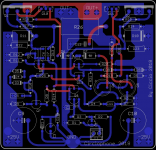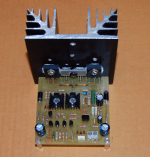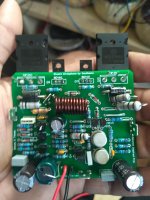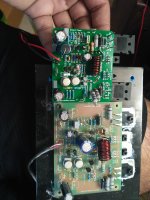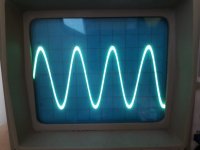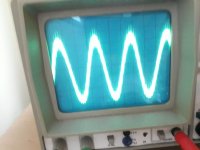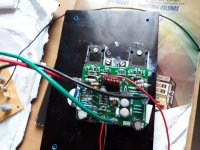Does any one have PCB layout of original Circlophone schematic. If so please post.
Thanks
here it is...
Attachments
Thanks for the post. Is there a single layer layout also.
no double layer only.
I have 3 pairs of pcb that I have more, I send only in Italy if someone is' interested only slightly different from the photo posted here
Last edited:
Strictly in accordance with the original scheme and perfect functioning...Thanks for the post. Is there a single layer layout also.
Attachments
Mr Elvee,
Suitable substitute for Schottky Diode MBRS340 as this is not available easily in India. Thanks. Katiyar
I have used SR504 from DIYAudiocart. It's an Indian online retailer. I think same part is available with 8 audio as well.
I highly recommend you go through circlophone build thread compiled by Daniel. Various alternative parts have been discussed there.
All the best for your build.
Circlophone in New (smaller pcb) avatar.
My take at circlophone pcb. (inspired by Alexmm). Fully tested and functional.
Running without a glitch on fake Mjl21194 .
Regards
Goutham
My take at circlophone pcb. (inspired by Alexmm). Fully tested and functional.
Running without a glitch on fake Mjl21194 .
Regards
Goutham
Attachments
Strictly in accordance with the original scheme and perfect functioning...
My take at circlophone pcb.
 Excellent jobs!
Excellent jobs!My take at circlophone pcb. (inspired by Alexmm). Fully tested and functional.
Running without a glitch on fake Mjl21194 .
Regards
Goutham
Hi do you have circuit for this board? Thank you
With respect to post no.1635
I tried the Current Drive mod, suggested by Elvee.
I used 0.22 ohm sense resistor for a 8 ohm load. The results: Subjectively,there is a bit more open upper mids and highs.There is no resonance boom and in general,the sound was balanced across the frequency spectrum.I have to mention that I use a single fullrange driver with a BSC network.I am not sure if it will work with higher order complex crossover network.So, To summarise, the difference is not very great ,but is not degrading either. You can give a try,and if it suits you, you may modify it..
I tried the Current Drive mod, suggested by Elvee.
I used 0.22 ohm sense resistor for a 8 ohm load. The results: Subjectively,there is a bit more open upper mids and highs.There is no resonance boom and in general,the sound was balanced across the frequency spectrum.I have to mention that I use a single fullrange driver with a BSC network.I am not sure if it will work with higher order complex crossover network.So, To summarise, the difference is not very great ,but is not degrading either. You can give a try,and if it suits you, you may modify it..
Hi there, this place is like heaven! Am Planning on building this amp. I believe i can order all parts except of chassis and transformer from the same place. Since i live in Argentina taxes are almost the same to total costs  . Still, ordering everithing from the same place via grabr can make me save lots of money.
. Still, ordering everithing from the same place via grabr can make me save lots of money.
This gonna be my first amp. I´m going to post wich parts i am planning to order so anyone can please help me not making expensive mistakes.
The parts i´m planning to order are:
1 x EI transfromer 400 va +-24 v or something like it. (from local store).
- 2 x Amp kit : DAC - Elvee's Circlophone - Power Amplifier
- 1 x Power supply : Eight Audio - EAPPS05NI - Audio Grade 4700uF 63V X 8nos Dual Rail Power Supply
? x Haetsinks : Indo Power - 8 Inch Heat Sink - HS08.
If i remember well the circlophone dissipates about 60 W p/c so the dissipant system should be about 0.4 K/W?. There is not much info about those heatsinks and i´m not sure if are suposed to be used with fans, wich i would like to avoid. Anyway, they seem the lowest ratio on site, and maybe a pair 'll do the trick...
Im gonna diy the chassis, i´m thinking in a lazy system that doesnt require drilling to keep heatsinks in place.
Do you guys think i´m missing something important here beyond jacks, cables, power switch,a multimeter, and maybe some other cheapy easy to get stuff?
Also most places here doesn´t have an adecuate ground conection, do you think that could lead to a really hard to get rid of noise problem?
Eitherway the forum is really helpfull and has an incredible world wide communitty, so, thanks to all helping that happen.
regards.
This gonna be my first amp. I´m going to post wich parts i am planning to order so anyone can please help me not making expensive mistakes.
The parts i´m planning to order are:
1 x EI transfromer 400 va +-24 v or something like it. (from local store).
- 2 x Amp kit : DAC - Elvee's Circlophone - Power Amplifier
- 1 x Power supply : Eight Audio - EAPPS05NI - Audio Grade 4700uF 63V X 8nos Dual Rail Power Supply
? x Haetsinks : Indo Power - 8 Inch Heat Sink - HS08.
If i remember well the circlophone dissipates about 60 W p/c so the dissipant system should be about 0.4 K/W?. There is not much info about those heatsinks and i´m not sure if are suposed to be used with fans, wich i would like to avoid. Anyway, they seem the lowest ratio on site, and maybe a pair 'll do the trick...
Im gonna diy the chassis, i´m thinking in a lazy system that doesnt require drilling to keep heatsinks in place.
Do you guys think i´m missing something important here beyond jacks, cables, power switch,a multimeter, and maybe some other cheapy easy to get stuff?
Also most places here doesn´t have an adecuate ground conection, do you think that could lead to a really hard to get rid of noise problem?
Eitherway the forum is really helpfull and has an incredible world wide communitty, so, thanks to all helping that happen.
regards.
The quiescent current of the C is around 200mA. In combination with a 2 x 24VAC transformer, this means about 14W dissipation/channel.If i remember well the circlophone dissipates about 60 W p/c so the dissipant system should be about 0.4 K/W?. There is not much info about those heatsinks and i´m not sure if are suposed to be used with fans, wich i would like to avoid. Anyway, they seem the lowest ratio on site, and maybe a pair 'll do the trick...
Of course, as with any amplifier, if you use it with a continuous sinewave between 2/3 and the max power, the dissipation will be substantially higher.
That will not be the case with normal musical signals.
For a domestic use, the HS. you show should suffice (1/channel)
Earthing is for electrical safety, not for hum or perturbations elimination.Also most places here doesn´t have an adecuate ground conection, do you think that could lead to a really hard to get rid of noise problem?
You should follow local safety regulations regarding earthing, and apply good practices for the grounding of supplies and signals (lots of info can be found on the subject, including on this site).
These are two different domains, even if they sometimes overlap.
Earthing an equipment to combat hum, or worse lifting a ground for the same purpose are bad practices.
Read and approved!Earthing is for electrical safety, not for hum or perturbations elimination.
You should follow local safety regulations regarding earthing, and apply good practices for the grounding of supplies and signals (lots of info can be found on the subject, including on this site).
These are two different domains, even if they sometimes overlap.
Earthing an equipment to combat hum, or worse lifting a ground for the same purpose are bad practices.
Yet I still see too many montages very poorly connected to this topic and even worse too many people who guide poorly novices (on this site too.
Elvee, can you confirm this again?
From the look of these heatsinks, and the fact that each of them weights 4.5kg, they should be good enough for a real 100W amp.
Isn't this an overkill for the circlophone?
I'm building this amp too, and I was planning for much smaller HS.
From the look of these heatsinks, and the fact that each of them weights 4.5kg, they should be good enough for a real 100W amp.
Isn't this an overkill for the circlophone?
I'm building this amp too, and I was planning for much smaller HS.
For a domestic use, the HS. you show should suffice (1/channel)
It is difficult to judge without hard data on thermal resistance under various conditions, but you should be aware that 4.5kg/m is the metric weight, ie weight per unit length, in this case one meter.
8" is ~20cm, or a fifth of a meter, meaning each sink should weight around 900g, or 2lb
8" is ~20cm, or a fifth of a meter, meaning each sink should weight around 900g, or 2lb
I see; didn't notice it's per meter. I thought each of these beasts is 4.5kg 
It is difficult to judge without hard data on thermal resistance under various conditions, but you should be aware that 4.5kg/m is the metric weight, ie weight per unit length, in this case one meter.
8" is ~20cm, or a fifth of a meter, meaning each sink should weight around 900g, or 2lb
- Home
- Amplifiers
- Solid State
- ♫♪ My little cheap Circlophone© ♫♪
